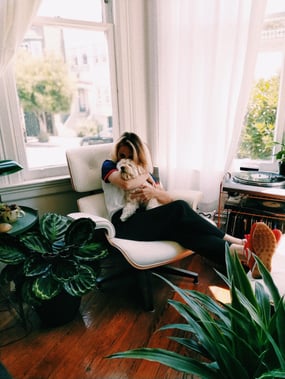How To Help Your Dog Adjust To Living In An Apartment
Updated on: September 13, 2022 | Author: Starwood Pet Travel
 Are you currently living in an apartment and considering adopting a dog? Or maybe you and your dog are moving from a home with a yard to an apartment. In this article, we'll go over how you can help your dog adjust to living in an apartment so that you'll both be as happy and comfortable as can be.
Are you currently living in an apartment and considering adopting a dog? Or maybe you and your dog are moving from a home with a yard to an apartment. In this article, we'll go over how you can help your dog adjust to living in an apartment so that you'll both be as happy and comfortable as can be.
Your cat may be seriously annoyed about no longer going outside to explore and hunt on their own, but they will get over it, especially if you give them new indoor opportunities to play and cushy window accommodations so they can continue to observe the action outdoors. Cats don’t require a lot of space to be comfortable.
Your dog, however, may be another story. Your beautiful 100 lb Alaskan Malamute may not fit into a tiny apartment. Your busy Border Collie may languish into depression in an urban environment without a job to do. Little dogs that yip-yap, Huskies that sing, and hounds that howl on occasion may not be apartment-appropriate, either.
If you cannot reasonably expect your cherished canine companion to thrive in the new apartment, perhaps moving with you is not right for them. On the other hand, there are ways to address other challenges that arise when your pet is transitioning from a house to living in an apartment. It will require some changes on your part, but modifying your life will help your pet adapt to its new life.
Anticipate behavioral breakdown
No matter how well you prepare your dog for a smooth transition, they may feel anxious and out of sorts anyway. This can lead to bad behaviors – mild issues such as sulking under the bed to serious problems such as barking, destroying items, or “forgetting” their potty training. Regressive behaviors happen because pets feel the need to assert themselves in their new surroundings, they’ve developed separation anxiety out of fear you really are going to abandon them or they’re afraid of the change and simply want to hide.
In the confines of an apartment setting, negative behaviors are magnified because they affect your neighbors as well as your own household. And when you’re renting, pet-caused destruction is considered an unforgivable offense.
Get back to the basics of training
Since your dog is tied to you emotionally and they try to follow your lead, you can help them adjust more easily by being calm but upbeat yourself.
Establish a new, consistent routine for bathroom breaks, especially if your dog was formerly able to let itself in and out through a doggie door. Start by taking him or her out frequently enough that they don't have an accident indoors, then increase the time between breaks. If they're already used to being home alone all day without going outside, that will help.
Get them used to new modes of transportation
Your dog may never have experienced stairs or an elevator before. They may hesitate when faced with stairs, but you can teach them step-by-step how to go up and down. If your dog isn’t fond of confined spaces, they may balk even more at entering an elevator. Keep them close and treat it as if it’s no big deal, just a fun ride. They'll be comfortable in no time.
Be a considerate neighbor
Apartment living means you'll be much closer to your human and furry neighbors. It’s important to introduce your dog to your nearest neighbors so they learn to recognize them by sight and smell. You'll also want to be respectful of your neighbors and make sure you clean up after your dog and keep them close to you in case others are not as comfortable around animals.
Get your dog acclimated to new sounds
Apartments come with weird noises your dog may not have heard before – people walking down the hall and past the front door, voices outside your apartment, the sounds of the elevator going up and down, and the “dings” associated with the doors opening and closing, other people’s dogs barking or whining as you walk past, etc. You can teach your dog not to react by distracting them with play or treats until they get used to these sounds.
If your absence during the day is something new, gradually work up to that by leaving for short periods at first, then staying away longer. This will help ease the separation anxiety many dogs suffer from.
Make sure your space is safe for your dog
If you have a small dog and a high balcony, make absolutely certain your pooch can’t squeeze through the railing. If you aren’t confident about that, line the inside with chicken wire or something you know they can’t breach. The possibility of a falling accident is unthinkable.
Be patient with your pup’s moving-related worries and their weird acting out – you probably feel like doing some of that yourself. Once you both get into the flow of your new routine, you’ll feel comfortable at home in your new apartment.
Subscribe to the Blog
Enjoy our content? Get them sent to your inbox!
Subscribe Now!

